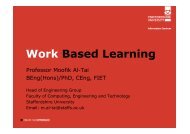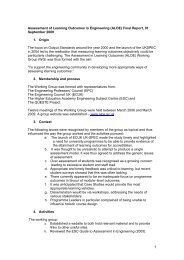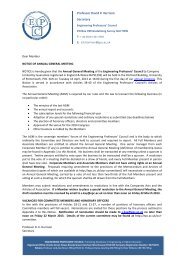The University of Sheffield: PowerPoint template
The University of Sheffield: PowerPoint template
The University of Sheffield: PowerPoint template
You also want an ePaper? Increase the reach of your titles
YUMPU automatically turns print PDFs into web optimized ePapers that Google loves.
<strong>The</strong> Development <strong>of</strong> REF:Current Thinking and ProgressGe<strong>of</strong> TomlinsonPro-Vice-Chancellor (Research)<strong>University</strong> <strong>of</strong> <strong>Sheffield</strong>
<strong>The</strong> end <strong>of</strong> RAE2008: lessonslearnt• <strong>The</strong>re were 6 sub-panels under Panel G(Engineering)• Approximately 25% <strong>of</strong> the overall qualitypr<strong>of</strong>ile was awarded on the basis <strong>of</strong>metrics• At the last main Panel G meeting severalaspects were identified5/15/2009 © <strong>The</strong> <strong>University</strong> <strong>of</strong> <strong>Sheffield</strong>
o Confidence was expressed in assessment <strong>of</strong>the research outputs including appliedresearcho Converting the two metrics <strong>of</strong> PhDs awardedand research income into a pr<strong>of</strong>ile wasdifficult5/15/2009 © <strong>The</strong> <strong>University</strong> <strong>of</strong> <strong>Sheffield</strong>
o Small submissions skewed the metricsapproach: size <strong>of</strong> return vs quality isimportanto Discrimination arising from pr<strong>of</strong>iling acrossgroupso Early career researchers – issues with theassessmento Rounding to 5% in quality levels5/15/2009 © <strong>The</strong> <strong>University</strong> <strong>of</strong> <strong>Sheffield</strong>
REF: Expert Advisory Groups• Drawn largely from Chairs and members <strong>of</strong> RAEpanels plus nominations from RCs and other keystakeholders• Over 100 members with broad coverage (5 fromEngineering)• 3 rounds <strong>of</strong> meetings covering all key features <strong>of</strong>REF:February 2009April/May 2009June 20095/15/2009 © <strong>The</strong> <strong>University</strong> <strong>of</strong> <strong>Sheffield</strong>
Proposed timetable:• Up to summer 2009:- conclude the bibliometrics pilot- take advice from EAGs- hold discussions with a wide range <strong>of</strong>stakeholders• Autumn 2009:- publish proposals on the key features <strong>of</strong>the REF for consultation with the sector5/15/2009 © <strong>The</strong> <strong>University</strong> <strong>of</strong> <strong>Sheffield</strong>
Proposed timetable (contd):• Early 2010:- announce outcomes <strong>of</strong> the consultation• 2013:- complete full assessment <strong>of</strong> all subjectsthrough the REF to drive funding from20145/15/2009 © <strong>The</strong> <strong>University</strong> <strong>of</strong> <strong>Sheffield</strong>
Questions being considered bythe EAGs• Panel/subject configuration options• How can HEIs reflect the impact <strong>of</strong>research• Key generic elements <strong>of</strong> assessment• Types <strong>of</strong> evidence and indicators• Options for combining evidence/indicatorsto produce overall quality pr<strong>of</strong>iles5/15/2009 © <strong>The</strong> <strong>University</strong> <strong>of</strong> <strong>Sheffield</strong>
Questions being considered bythe EAGs (contd)• Eligibility• Output creditation/number <strong>of</strong> outputs• Number <strong>of</strong> expert panels• Consistency aspects across panels• Scope for reducing burden <strong>of</strong> data collection• Alignment <strong>of</strong> REF to an institution’s researchmanagement5/15/2009 © <strong>The</strong> <strong>University</strong> <strong>of</strong> <strong>Sheffield</strong>
Some reflections from the EAGs• Scope for fewer panels but:Increase in members per panel, not necessarilyreduce burdenCoverage/lack <strong>of</strong> coherenceLarger disciplines in broad panels, impact on‘smaller’ disciplinesLimited scope for fewer, broader panels5/15/2009 © <strong>The</strong> <strong>University</strong> <strong>of</strong> <strong>Sheffield</strong>
• Impact:Important to take more explicit accountHEIs might produce a portfolio involving longerand shorter term impacts using case studiesEnabling impact: KT engagement with usersand the publicEligibility:Retain this but consider the use <strong>of</strong> a moreconsistent methodology5/15/2009 © <strong>The</strong> <strong>University</strong> <strong>of</strong> <strong>Sheffield</strong>
• Outputs:4 outputs suggested to be roughly right but someflexibility needed, e.g. ‘2 in A&H but 4 in STEM’• Output creditation:To follow the individual• Consistency:Use same % outputs for all panelsPropose the use <strong>of</strong> a ‘<strong>template</strong>’ for RA5 and betterguidelinesInternational experts on all panels5/15/2009 © <strong>The</strong> <strong>University</strong> <strong>of</strong> <strong>Sheffield</strong>
• Burden reduction:o Communication needed ASAP on what datacollection to enable HEIs to introduceappropriate IT systemso High level aggregation will reduce worko Use <strong>of</strong> more pro-formas5/15/2009 © <strong>The</strong> <strong>University</strong> <strong>of</strong> <strong>Sheffield</strong>
ToDiscoverAndUnderstand.







